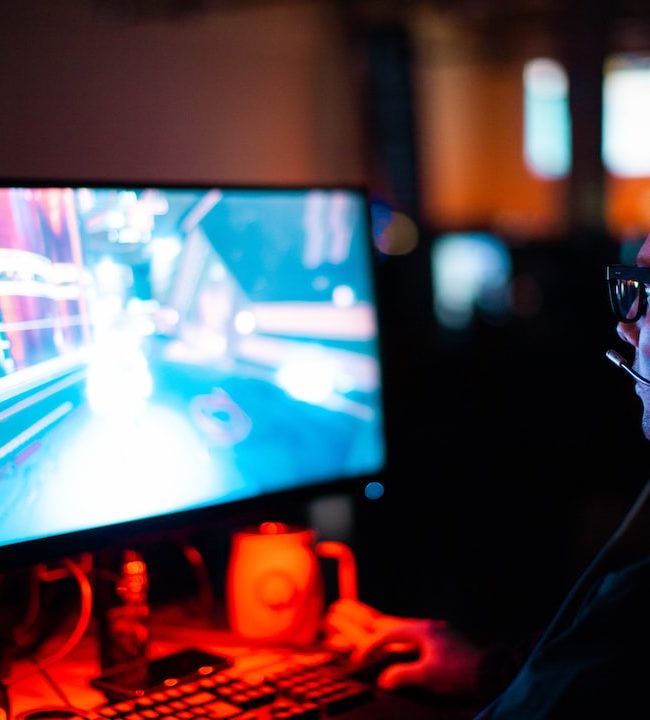The growth of Web3 gaming is a phenomenon impossible to ignore.
This sector, which originated from the combination of blockchain tech and video games, has seen an amazing rise in interest lately.
Web3 gaming stands as a testament to how far we’ve come from traditional gaming models. It’s not just about playing anymore; it’s about owning, earning, and even governing.
The world is waking up to this reality – that the Growth of Web3 Gaming isn’t merely a trend but rather the future of interactive entertainment itself.
Table of Contents:
- The Meteoric Rise of Web3 Gaming
- Web3 Gaming: A New Era Beyond Traditional Games
- Pioneers Leading the Charge in Web3 Gaming
- The Economic Impact of Web3 Games
- Understanding Ownership of In-Game Assets in Web3 Gaming
- Anticipating the Future of Web3 Gaming Industry
- Transitioning into Web3: A Guide for Game Developers
- Conclusion
- Web3 Gaming Resources
The Meteoric Rise of Web3 Gaming
Web3 gaming has seen an exponential growth, skyrocketing by 2000% from 2023 to the end of 2023. The surge is indicative not only of its popularity but also acceptance in the global gaming landscape.
Predictions suggest that web3 games will onboard between a whopping 10 million and 100 million gamers within just a few years. This new era promises unique opportunities for players beyond mere entertainment – it’s about earning while playing.
Unpacking Revenue Generation
In terms of revenue generation, blockchain games have proven their worth with $2.5 billion generated solely in Q1 of 2023 (Decrypt). These figures underscore how rapidly this sector is expanding as more players discover its potential.
This rise poses significant implications for traditional gaming companies which are yet to fully embrace these changes or integrate effectively with web3 technologies.
A Shift in Spending Patterns?
An estimated $100 billion are spent every year on purchasing in-game items within traditional platforms – funds which might increasingly flow towards web3 platforms if current trends continue (Statista).
Navigating Industry Changes
To stay competitive amidst these seismic shifts, many established studios need to explore ways they can leverage blockchain technology while still delivering compelling user experiences.
No matter what path they choose though; one thing is certain: there’s no turning back now – we’re witnessing just the beginning stages of an exciting revolution set out by none other than Web-Three itself.
Web3 Gaming: A New Era Beyond Traditional Games
The gaming industry has long been a stronghold of traditional companies, crafting experiences that captivate and engage players. However, with the advent of web3 games, there’s an evolution in progress.
The Limitations of Conventional Game Models
Inherent to most conventional game models is a centralization issue where developers and publishers wield all control over gameplay changes or decisions about digital assets within their virtual worlds. This often leaves gamers feeling powerless despite investing significant time into these platforms.
Apart from this power imbalance, privacy concerns are another major drawback associated with traditional gaming structures. Personal data collected by these platforms can be misused without player knowledge or consent – something increasingly worrisome for many users today (Kaspersky).
Monetization opportunitiesa€”or rather lack thereofa€”for players present yet another challenge in traditional games. Players invest billions annually on in-game items but rarely see any financial return on their investments (Newzoo).
Pioneering Advantages Offered by Web 3 Gaming Platforms
Drawing sharp contrast against its predecessor’s limitations is the innovative world of web 3 gaming which brings several revolutionary advantages to table.
One such unique feature offered by blockchain-based ecosystems is asset ownership; it allows gamers true possession over acquired virtual assets a novel concept unheard-of in previous generations’ games.
Beyond mere possessions though lies play-to-earn opportunities another groundbreaking innovation brought forth through web 4 technology that enables users generate income via gameplay activities an unprecedented shift away from revenue models that typically only benefit developers and publishers(Decrypt).
.
Last but not least among benefits provided through web 4 platform include interoperability features enabling use certain items across multiple titles enhancing user experience significantly as compared conventional counterparts usually restricting usage purchased content solely individual titles (VentureBeat) .
Web3 gaming is shaking up the traditional game industry, breaking down centralization barriers and giving players true ownership of digital assets. It’s a play-to-earn revolution that not only enhances user experience but also addresses privacy concerns and offers new monetization opportunities for gamers.
Pioneers Leading the Charge in Web3 Gaming
Web3 gaming has been significantly shaped by a handful of pioneering figures and companies. These innovators have not only adopted blockchain technology but also used it as a springboard to create engaging, profitable web3 games.
A leading example is Axie Infinity, which employs an innovative play-to-earn model that has attracted thousands of gamers worldwide who now earn cryptocurrency through gameplay. The blend of traditional RPG elements with novel blockchain features like true ownership and earning potential for players sets new standards within the industry.
This shift towards democratizing gaming experiences shows how web3 gaming can offer more than just entertainment value; it’s about creating sustainable economies where players are stakeholders rather than mere consumers.
Immutable, another trailblazer in this space, developed Immutable X aiming at making Ethereum-based games scalable without compromising on security or decentralization aspects inherent to blockchain technology. Their recent partnership with Polygon promises faster transaction times and lower gas fees – two critical factors often criticized about Ethereum network transactions – thereby enhancing user experience on any future web3-enabled games built on these platforms.
Innovative projects such as these demonstrate whata€™s possible when developers leverage the power of blockchain effectively while keeping player-centric design principles at heart. They’re paving way for smoother gameplay across multiple games while addressing some key challenges faced by game developers working with blockchain technologies today (House Of Legends).
The Economic Impact of Web3 Games
Web3 gaming is dramatically altering the economic landscape within virtual worlds. By integrating blockchain technology, these platforms are granting players genuine ownership over their digital assets and establishing robust economies (TechCrunch). This transformative shift has substantial implications for dapp activity across multiple games.
This change allows gamers not only to enjoy immersive experiences but also earn income through ‘play-to-earn’ models. Furthermore, it paves way for new job roles such as professional game testers or digital asset traders.
Blockchain Technology: A Catalyst for Virtual Economies
Incorporating blockchain technology into web3 games introduces an element of transparency and trust that was previously lacking in virtual economies. It facilitates fair transactions without intermediaries like banks or payment processors while smart contracts automate complex processes like auctions or rentals of in-game properties efficiently.
- Fractional Ownership: Blockchain enables fractional ownership where users can collectively own parts of high-value assets – creating investment opportunities otherwise inaccessible due to whole ownership costs.
- Economic Activity Stimulation: Dapps built atop blockchain networks foster economic activities between players within web3 games by allowing trading between different types of tokens representing various forms/forms/value including currency units, property rights over virtual land parcels or unique collectibles known as Non-Fungible Tokens (NFTs).
Dapps Driving Demand & Growth
Understanding Ownership of In-Game Assets in Web3 Gaming
In the evolving world of web3 gaming, players are not just collecting items for gameplay. They have tangible rights over their virtual assets which is a significant shift from traditional game dynamics.
The Transition: From Mere Game Items to Digital Wealth
Items such as weapons or skins in conventional games serve only within the confines of that particular game and hold no real-world value. However, with blockchain technology powering web3 games, these ordinary objects transform into valuable digital assets.
This unique feature adds depth to user experience while providing opportunities for gamers to monetize their skills acquired during gameplay.
Achieving True Property Rights in Virtual Worlds
To sustain economies within virtual worlds effectively requires granting genuine property rights to users – empowering them by giving full control over their digital possessions. (House Of Legends).
.
- Gamers can decide what they want do with owned asseta€”keep it for personal use,
- Sell it on platforms like OpenSea or Rarible,
- Rent out earning passive income through DeFi protocols similar Aavegotchi
. This level freedom was unheard-of under traditional gaming models where content remains strictly controlled by developers publishers. Web has revolutionized this dynamic decentralizing power allowing players autonomya€”a step forward democratizing online world.
Anticipating the Future of Web3 Gaming Industry
The trajectory for web3 gaming industry is nothing short of exhilarating. As MarketWatch reports, experts anticipate a steep upward trend in this sector driven by technological advancements and an ever-growing gamer community.
A significant forecast involves integrating metaverse technologies with web3 games. The prospect of creating shared virtual worlds where users can interact with each other and digital assets could revolutionize user experience in gaming while redefining concepts like value and ownership within these blockchain-based economies.
Besides, Artificial Intelligence (AI) holds immense potential to transform the landscape of web3 gaming further. By facilitating dynamic game environments that respond to player actions, AI can blur boundaries between reality and virtual experiences even more effectively than before.
Navigating Potential Roadblocks
In spite of such promising prospects on the horizon, it’s crucial not to overlook some challenges likely to surface along this journey. One major concern revolves around scalability issues which necessitate robust infrastructure capable enough for handling high volumes without compromising security or performance aspects inherent in blockchain games.
Furthermore regulatory concerns demand attention as well since they pose their own set of unique challenges when dealing with mainstream applications like gaming using blockchain technology; therefore regulators worldwide need better understanding about its implications so they can establish suitable legal frameworks accordingly.
Leveraging Innovation In Web 1 To 4 Transition
To capitalize on these exciting opportunities traditional companies must be willing embrace innovation wholeheartedly but also remember keep player-centric design principles at heart during transition from conventional approaches used currently into new paradigms introduced by Blockchain Technology especially true asset ownership play earn models significantly different what we see today’s world.
This won’t happen overnight however those who begin early have chance securing prominent place rapidly evolving landscape thereby redefining modern day entertainment looks.
Web3 gaming is on an exciting growth trajectory, fueled by advancements in metaverse and AI technologies. However, it’s not without challenges like scalability issues and regulatory concerns. Traditional companies can seize this opportunity by embracing innovation while maintaining player-centric designs, especially as we transition from Web 1 to 4.
Transitioning into Web3: A Guide for Game Developers
The gaming industry is evolving, and the rise of web3 games signals a significant shift. As game developers navigate this new landscape, understanding blockchain technology becomes paramount.
In essence, transitioning from traditional development to creating engaging experiences on a web3 gaming platform requires more than just technical skills; it calls for adopting new paradigms while keeping player-centric design principles at heart.
Demystifying Blockchain Technology
Blockchain serves as the backbone of any successful transition towards developing web3 games. Understanding how transactions are processed within its decentralized network and grasping key concepts such as consensus mechanisms or encryption can be instrumental.
- Familiarity with Ethereum or other similar platforms that support dApps (decentralized applications) is crucial due to their role in facilitating interactive gameplay where players have genuine control over their digital assets.
- A deep dive into smart contracts – self-executing agreements based on predefined conditions – provides insights into automating actions like transferring virtual items between players once certain criteria are met.
- An appreciation for Solidity programming language used in writing these contracts will prove invaluable especially when considering transaction speed and cost implications related to gas fees within your game environment.
Navigating Digital Assets Management
Incorporation of digital asset management strategies ensures smooth operation within the realm of web 2023web 2023gaming . This could entail designing tokenomics models balancing supply-demand dynamics around various types virtual goods , setting up marketplaces users freely trade theirs . Ultimately , transitioning isna€™t about discarding everything you know traditional developer but rather expanding toolkit technologies paradigms .
Conclusion
The meteoric rise of Web3 gaming is nothing short of astounding.
It’s a whole new world, where traditional gaming models are being disrupted and reimagined.
We’ve seen how blockchain technology empowers players with true ownership over their digital assets.
Pioneers like Axie Infinity and Immutable are leading the charge, proving that play-to-earn models can thrive in this space.
Economic structures within virtual worlds are changing too, giving birth to sustainable economies based on real asset ownership.
Despite potential challenges ahead, the future looks bright for the Web3 gaming industry as it continues to evolve at breakneck speed.
Web3 Gaming Resources
Web3 Gaming Resources is here to help.
We provide resources and insights designed specifically for businesses aiming to leverage emerging trends like the growth of Web3 Gaming.






